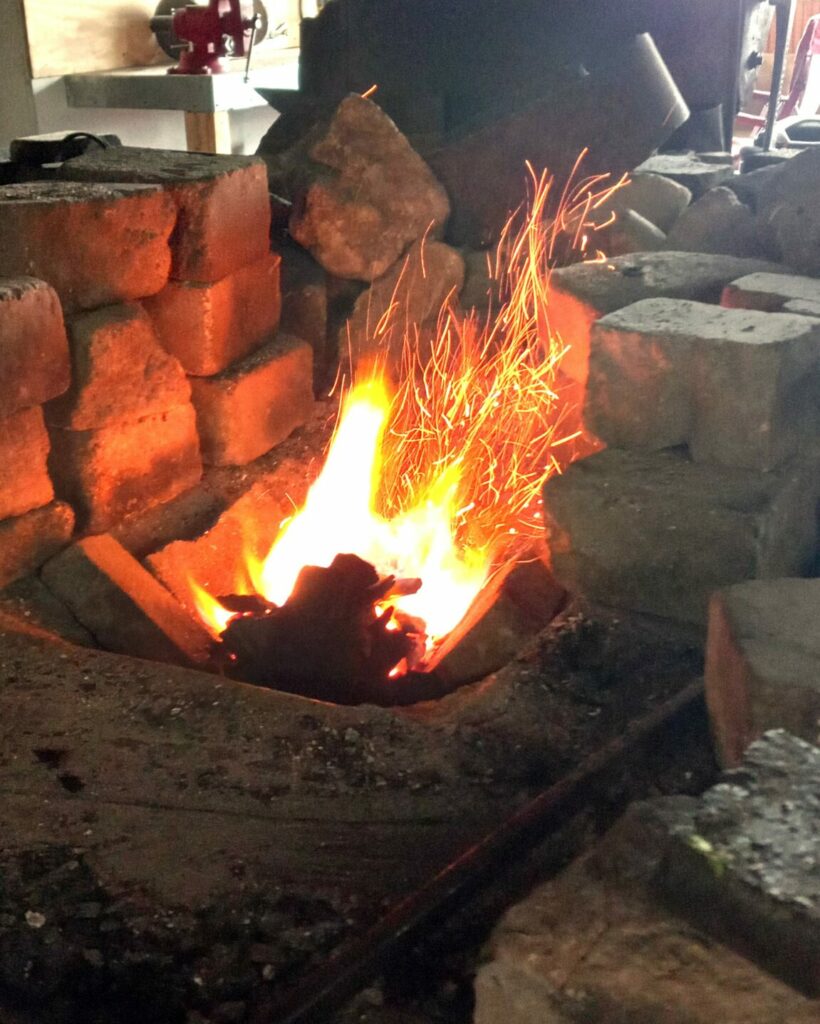The Duluth Forging Community is actively living their mission to bring the art of blacksmithing back to life in the Northland. The nonprofit was formed in 2012 with the mission “…to educate, to the best of our abilities, the general public about the art and craft of metalsmithing. We will teach all who wish to learn and practice the craft with us, deepening and broadening our knowledge of the art, thus ensuring the survival and sustainability of metalsmithing into the future.”
The group was organized by Paul Webster with the dream of eventually creating a blacksmithing school. Webster was working out of his home shop in Esko, informally allowing others in the trade to utilize the space as a drop in shop to do their “smithing.” However, the number of participants soon grew. A more neutral place with a more coordinated schedule was needed, so those involved formed a board of directors and created the nonprofit organization known as the Duluth Forging Community. Forging refers to making or shaping a metal object by heating it in a fire or furnace and beating or hammering it.
The newly formed organization found a permanent home in Duluth and opened for public classes in 2013. Today, the group consists of 10 instructors with over 100 years of smithing experience between them, and classes are available seven days a week and are open to anyone interested in learning the trade.
All members begin at the student level, needing 28 hours of supervised work before advancing to the next level. Students work at their own pace, and the process can take anywhere from one month to a year. Webster makes it clear that, “It is not about how long it takes, it is about the quality of work.”
The criteria to become a Crafter Member is loosely based on the guidelines of the Guild of Metalsmiths. This is a regional organization whose goal is to preserve and pass on the knowledge, art, and skills of working metal, including blacksmithing and bladesmithing, and many other techniques.
The member process is made up of three steps, which begins with the ability to create a small project, usually an “S” hook or bottle opener. The second step utilizes different skills, such as visualization of creating a three-dimensional item that includes right angles and loops. Finally, a student must demonstrate they have the power to move (shape) large amounts of metal needed for a long fire poker or knife. Webster emphasized that the process is not a pass or fail—instead, instructors work with students providing critique and opportunities to eventually be successful. Students range from age 11 to folks in their late 80s, and they are open to all backgrounds, interests, and abilities.
Webster has been smithing since 1988 and holds a masters of education in special experiential education and a minor in art. He brings this expertise to metal crafting through mentoring many young students, some who have since joined as instructors with the Duluth Forging Community.
Warren Bettencourt started with Webster over 20 years ago when he was 11 years old. He now runs his own crafting business, selling his hand-forged metalwork and custom pieces, and is also a full-time instructor. Bettencourt says his favorite part is the ability “to take something you have imagined and with heat and a hammer, turn it into something. It is like seeing the birth of your idea.” He has been in the field for 10 years, graduating from the Lake Superior College welding program. He enjoys being an instructor and having the opportunity to share something he is passionate about.
In addition to offering metalsmith classes, the Forging Community also offers demonstrations and educational events on site and throughout communities along the North Shore. A special program developed nearly 10 years ago is the unique collaboration with the 23rd Veteran of Duluth. This program offers support to veterans experiencing trauma and offers a variety of services to veterans and their families. Metalsmithing serves as a form of occupational therapy and a healing transition into the civilian world, once discharged from the military.
During the summer season, members of the Forging Community can be found at a variety of festivals and art shows selling their work and educating visitors about their craft. More information can be found online at: fcduluth.org.

